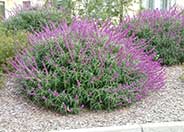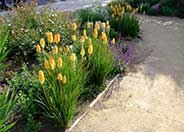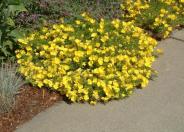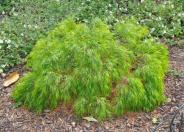
Common name:Mexican Bush Sage, Velvet Sage
Botanical name:Salvia leucantha
The Mexican Sage is a bushy shrub that grows 3'-4' tall and wide. It has hairy white stems, gray green leaves and velvet-like purple flower spikes that bloom summer through fall. This shrub tolerates sun, light shade, little water, and is hardy to 15 degrees F. The Mexican Sage is drought tolerant and attracts hummingbirds. -Cornflower Farms

Common name:Torch Lily
Botanical name:Kniphofia hybrids
This perennial will grow to about 6' tall and has large green leaves with red, orange, and yellow flowers that bloom in spring, summer, and fall.

Common name:Santa Barbara Daisy, Mexican Daisy
Botanical name:Erigeron karvinskianus
This low mounding perennial, with fine leaves and white to pinkish, daisy-like flowers, is an excellent asset to rock gardens.

Common name:Saltillo Evening Primrose
Botanical name:Oenothera stubbei
This ground cover grows quickly to 6" x 4'. The dense mat of dark green foliage provides a nice back drop for the large butter yellow flowers. Blooms appear spring through fall. The flowers have a sweet fragrance and are open from dusk to early morning. Native to northeast Mexico.

Common name:Little River Wattle
Botanical name:Acacia cognata 'Cousin Itt'
This low shiny ground cover has a low mounding form. It does well in both hot inland or coastal settings, needing little water or care once established. It is a great addition to Mediterranean style gardens, excellent for hillside plantings, rock gardens, mass plantings and with dry creek beds. It is small in stature growing less than 2 feet tall and 4 feet wide. It looks like side-ways bamboo.
Designer:
Photographer: Vicki Anderson
Physical weed control, including mulching, or hand removal protects the watershed from harmful chemicals.
Remove irrigation water and fertilizer from areas where you don't want weeds to grow.